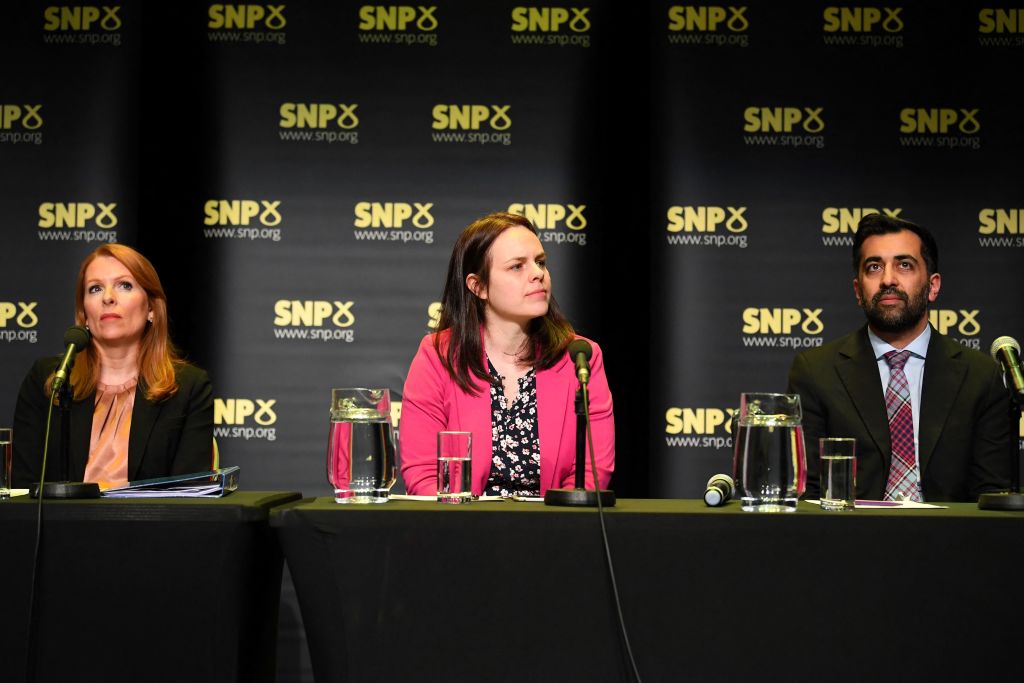‘Now is not the time,’ successive Tory prime ministers told Nicola Sturgeon following her persistent calls for another independence referendum. It’s simply too soon after the last one, they said. In August, the Scottish secretary, Alister Jack, caused fury in nationalist circles after he stated there would need to be at least 60 per cent support for independence in opinion polls before the UK government would respond to further Section 30 referendum requests.
Strange, then, that this Tory message appears to be exactly what the SNP leadership candidates were parroting in Tuesday night’s now infamous STV debate. So transfixed were commentators by the blue-on-blue attack lines – or perhaps ‘yellow-on-yellow’ – used by Kate Forbes and Humza Yousaf, they didn’t quite pick up on the remarkable change in nationalist rhetoric. The candidates were saying, in essence, that now is not the time for an independence referendum.
Forbes’s take was that independence would only happen when the SNP had persuaded the majority of Scots to vote for independence. Only she, Forbes believes, has the ability to ‘reach out to those not persuaded’. Yousaf said similar, agreeing that only a ‘consistent majority support for independence will mean those political obstacles put up by Westminster will be overcome’. Even the most bullish of the nationalist contenders, Ash Regan, agreed that support for independence had to be built anew by creating a cross-party ‘independence convention’.
In terms of rhetorical U-turns, this is pretty remarkable. Only last week, Forbes said she would plan to hold an independence referendum ‘within three months of the next general election’ while Yousaf has said throughout the contest that ‘every election’ would be about independence. What’s changed?
The audience, for one. What the candidates say to the SNP faithfuls in hustings is different to what they say to the Scottish voters as a whole in a broadcast debate. The candidates know that they can’t pretend that independence is around the corner — everyone knows it isn’t. We saw partly why that is in the latest opinion poll: there has been a dramatic decline in support both for the SNP and independence.
According to Redfield and Wilton, support for ‘Yes’ has fallen by seven points since November. ‘No’ now has a nine-point lead: with 51 per cent of those polled saying they’d vote to stay in the Union, versus 42 per cent who would vote to leave. Not only that, the poll also revealed a remarkable increase in the numbers who believe the SNP government is incompetent. For the first time in years, Labour has a 10 per cent positive approval rating, while the SNP’s turns negative.
Labour’s huge lead in the UK opinion polls suggest that Keir Starmer is likely to be entering Number 10 next year. This alters the chemistry of The National Question.
This wilting support for independence pre-dates Nicola Sturgeon’s abrupt resignation, it is important to add, but it has more than accelerated since then. The candidates’ internal polling will have shown them that voters are concerned now with issues like the cost of living crisis, energy bills and hospital waiting lists. Enthusiasm for breaking up the United Kingdom, which reached its zenith under Boris Johnson, is settling down now that he has gone.
Moreover, Labour’s huge lead in the UK opinion polls suggest that Keir Starmer is likely to be entering Number 10 next year. This alters the chemistry of The National Question. If Labour prevails in 2024, the claim that Scotland is ruled by ‘Tory governments Scots haven’t voted for’ will no longer ring true. Sturgeon and other SNP figures have tried to argue that the ‘Red Tories’, i.e. Labour, are no different to the Conservatives — but this simply isn’t the case.
It is now clear why Sturgeon’s successors were so keen to ditch the First Minister’s idea of turning next year’s general election into a ‘de facto’ referendum: the polls are going the wrong way. Defeat in 2024 would, under the de facto strategy, allow Unionist parties to claim that the SNP got their ‘Indyref2’ — and lost. This would be cataclysmic for the pro-independence movement.
And this is the backdrop to the extraordinary scenes in the SNP debate when finance secretary Forbes tore into Yousaf’s ministerial record and he in turn accused her of a ‘lurch to the right’. When Forbes says ‘continuity doesn’t cut it’, she is reflecting the sharp decline in voter respect for what she calls the ‘mediocrity’ of the SNP government. Her take on the opinion polls appears to be that the only way to recover support for independence is to demonstrate to ‘No’ voters that an SNP government can manage the economy competently and listen to business: ‘good governance,’ she repeats. And perhaps her messaging is working: the Channel 4-commissioned Ipsos poll ahead of tonight's debate demonstrates that Forbes is significantly more popular amongst ‘No’ voters than her opponents.
On the other hand, Yousaf appeals to younger Scots who, like the Greens, tend to think capitalism is wrecking the planet and they also, Yousaf believes, back Sturgeon’s gender bill. Youth are the future and Yousaf is using this to guide his campaign messaging, talking of his ‘progressive agenda’ and slamming Forbes for her ‘rolling back on progressive values’ like gay marriage.
The dividing lines between the front runners have been clearly set out: it’s a culture war and it runs deep. But while the leadership contest remains anyone’s race, it looks as if independence has already lost.







Comments